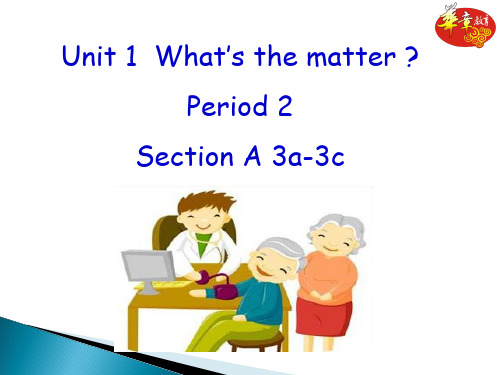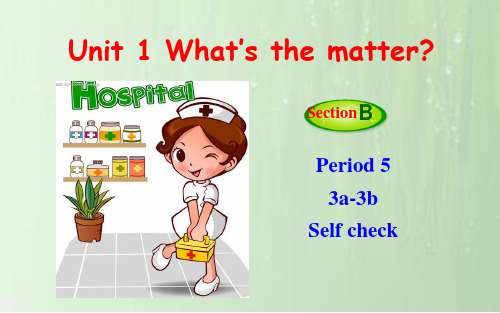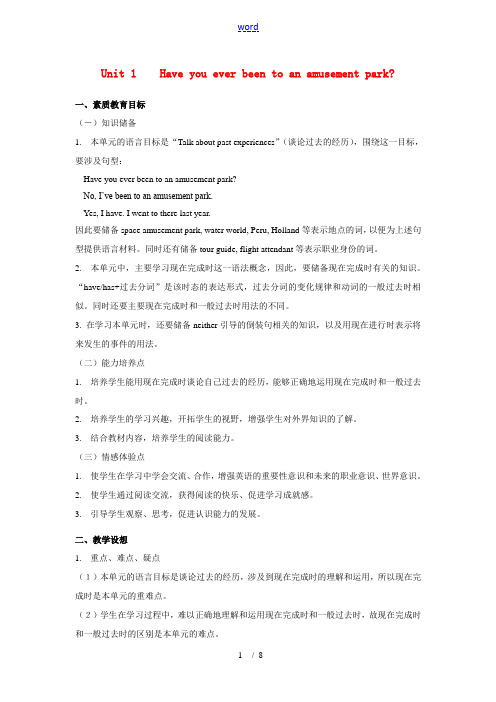八年级下Unit1 3b课文
人教版英语八年级下册 Unit1_教材解读

Unit1 名师教材解读1. Textbook Analysis教材解读本单元以“健康与急救(Health and first aid)”为话题,围绕健康问题,学会表达伤病疼痛,正确地给予急救建议。
Section A在内容上侧重健康问题,从身体部位的名称,伤病名称的词汇入手,句型上把握“What’s the matter (with...)? I have a cold/fever/...”。
语法上重点突出表达身体不适的句型结构,包括学会使用含有动词have, hurt的表达方式及情态动词should表达建议。
在情感态度方面,3a-3c 部分利用公交司机停车救人的故事来发展学生阅读技能,扩展学生学习相关语言表述的同时,通过课堂讨论进行情感态度价值观的教育。
Section B在话题上,从Section A中侧重围绕健康问题谈论疾病及不适转向对事故伤害,急救(first aid)的讨论。
在语言上,进一步综合训练和巩固Section A中所学语言重点,但是更加丰富了词汇及相关表述。
按照教材内容,也可以特别对急救的步骤和顺序进行训练。
在技能上,综合了听说能力,突出阅读训练。
在教学策略上,要引导学生利用作者对事件先后顺序的发展描述来理解整篇内容。
在情感上,引导学生学会面对生活中的困难及陷入困境时,要坚强、独立、勇敢、果断、理智。
像Section B长文章中的主角一样,树立抓住哪怕是一丝希望也永不言放弃的精神,热爱生活,珍惜生命。
1.1Section A 1a 活动1a是Lead-in部分。
旨在通过复习绝大部分学生以前学习过的关于身体各部位的词汇,为下面的身体不适的表达法做准备。
学生对本部分词汇有一定的基础,可通过直观手段学习该部分的词汇,对发音做纠正。
如果部分词汇有困难,教师及时处理这部分后,即可过渡到身体不适的表达,从已知到新知。
1.2Section A 1b-1c 活动1b-1c是Listening and speaking部分。
人教版八年级下册第一单元 A 3a-3d 带原文

1.你发烧了吗? Do you have a fever ? 2.听起来你不像是发烧。
It doesn’t sound like you have a fever. 3.你需要休息远离电脑。 You need to take breaks away from the computer.
Unit 1 What’s the matter ? Period 2
Section A 3a-3c
STUDYING GOAL 学习目标
1.Words&Expressions掌握重点单词、短语和句型2. Reading训练阅读能力
重难点
Talk about health problems and a
12.fall down 意为 摔倒 跌倒 倒塌 其后跟宾语时要加介词from
此时 fall down from =fall of 意为 从……上掉/摔下来
1) 看到某人正在做某事 2) 让某人吃惊的是 3) 下车 4) 上车 5) 多亏,幸亏 6) 考虑 7) 同意做某事 8) 造成麻烦
see sb. doing sth. to one’s surprise get off the bus get on the bus thanks to think about agree to do sth. get into trouble
along …
Where
at… When
Para.1
nnTihnge begi What
…
the driver
Who the old man
the woman
Read more carefully and finish the tasks
Wang Ping: stopped…, got off and a sked…,
人教版英语八年级下册Unit1 Section B 3a-3b Self check

_4__ What should I do? _5__ I think you should see a doctor
and get an X-ray.
_6__ OK, thanks. I’ll do that now. _1__ What’s the matter? __3_ Oh, that doesn’t sound good.
have a fever/have a Other problems: _n_o_s_e_b_l_ee_d_/_c_u_t_o_n_e_s_e_lf___
2 Put these questions and answers in
order to make a conversation.
_2__ I hurt myself playing soccer. I have a sore leg.
Work in Pairs
A: What’s the matter with…? B: He/She has a …
hurt have a fever have a cold have a toothache have a headache have a sore throat
八年级下册第一单元英语课文

八年级下册第一单元英语课文In the first unit of the eighth grade English textbook, students are introduced to various topics related to personal experiences and daily routines. This unit focuses on helping students improve their speaking and writing skills by discussing their own experiences and routines. Throughout the unit, students learn new vocabulary, practice grammar structures, and develop their reading and writing abilities. 。
The unit begins with a reading passage titled "My Daily Routine" which describesthe daily routine of a girl named Lisa. The passage provides an example of how to talk about daily activities in English. It includes vocabulary related to waking up, getting ready for school, eating breakfast, attending classes, doing homework, and going to bed. 。
After reading the passage, students are encouraged to discuss their own daily routines in pairs or small groups. They can ask each other questions such as "What timedo you wake up?", "What do you do after school?", and "When do you go to bed?". This activity helps students practice asking and answering questions using the present simple tense. 。
龙陵县十中八年级英语下册Unit1What'sthematter单元写作专题_SectionB(3a

when 和 while 的区别
1) 假设从句是一个短暂性动作 , 主句是一个持续性动作 , 可用 when 但不用 while :
It was raining hard when we arrived. 我们到达时正下着大雨。
2) 表示主、从句正在进行的动作或状态的対比时多用while :
While she was making a phone call, I was writing a letter. 3) when 可用作并列连词 , 表示〞这时(突然)” , 但while不可以 ; while 可以用作并列连词 , 表示〞而、却”(表示対比) , 但when没有 这种用法。
考试加油!奥利给~
What were they doing when it began to rain?
They were playing computer games when it began to rain.
They were playing chess when it began to rain.
__s_t_o_l_e_ (steal) his car.
5. While we _w_e_r_e_w__a_it_i_n_g_ (wait) for the bus, a girl _w_a_s__r_u_n_n_i_n_g_ (run) up to us.
6. I _w__a_s_p_h_o_n_i_n_g_ (telephone) a friend when Bob _c_a_m__e__ (come) in.
新会区五中八年级英语下册Unit1What'sthematter第四课时SectionB(2a_3b

第四课时Section B(2a-3b)Teaching Key Points【教学重点】The vocabulary:ourselves,accident,situation,knife,blood,mean,importance,decision,control,spirit,death,nurse,be used to,take a risk(take risks),run out,cut off,get out of,be in control of, keep on(doing sth.),give upTarget language:1.Aron Ralston is an American man who is interested in mountain climbing.2.Aron is used to taking risks.3.He was not ready to die that day.Teaching Difficult Points【教学难点】1.be used to doing sth.2.give up doing sth.3.Learn to describe events in a certain order.Teaching Aids【教学工具】an English book,a tape recorder and CAITeaching Steps【教学过程】★Step 1Preview and perception【预习感知】Ask the students to read the vocabulary and target language.用所给单词的适当形式填空。
1.We sat around the fire to keep ______(our) warm.2.At last he made a ______(decide).3.You should give up ______(smoke).4.Nobody knew his ______(die).5.He bandaged his arm so that he would not lose too much ______(blood).★Step 2Consociation and exploration【合作探究】Let the students read the book by themselves in order to find out the answers.They can discuss the questions in groups or ask the teacher for help.When they finish the questions,ask some students to check the answers.★Step 3Leading in【情景导入】1.Greetings.2.Introduce what to learn in this period,especially the article in 2b,He Lost His Arm But Is Still Climbing.★Step 4Pre-task【准备任务】Page 6,2a1.Look at 2a.2.T:Accidents or problems can sometimes happen when we do sports.Write the letter of each sport next to each accident or problem that can happen.3.Ask the students to talk about what we should do when the accidents or problems happen.4.Practice the conversations in pairs.5.Ask some pairs to act it out.★Step 5While-task【过程任务】Page 6,2b1.Present these new words on the screen and teach the new words.2.Ask students to repeat them.And make sure everyone knows the meanings.3.Write the words you don't know the meanings in the box.And then look up the words in the dictionary.Writers describe events in a certain order.Finding the order of events will help you understand what you are reading.4.Practice reading the passage.5.Page 7,2c & 2d(1)Read the passage again.And circle True,False or Don't Know.(2)If they can't find the answers,they can discuss in groups or ask the teacher for help.(3)Ask one or two students to check the answers.(4)Ask the students to read the passage quickly and find the answers in 2d.★Step 6Post-task【后续任务】Page 7,2e1.Ask the students to put the sentences in the correct order.Then use them to tell Aron's story to the partner.2.Try to add other details from the reading.3.Page 7,3a(1) Look at the accident or health problem.(2) Imagine you are the school nurse and a student just had an accident or a health problem.Make notes about what he /she should and shouldn't do.Discuss them in groups.4.Page 8,3b(1)Look at the questions and the phrases in the box.(2)Ask the students to read and practice the questions and the phrases in the box.★Step 7Consolidation practice【巩固练习】Look at the students' book of the 4th exercise.★Step 8Summary【课堂小结】In this class we have learned a passage.We should master it.And we should master the new phrases “be used to,take a risk(take risks),run out,cut off,get out of,be in control of, keep on(doing sth.),give up”,too.★Step 9Homework【家庭作业】1.Write a strange event after class.2.Retell the story about Aron Ralston.Board Design板书设计Unit 1What's the matter?The fourth period Section B(2a-3b)1.Key words:ourselves,accident,situation,knife,blood,mean,importance,decision,control,spirit,death,nurse2.Key phrases:be used to,take a risk(take risks),run out,cut off,get out of,be in control of,keep on(doing sth.),give up3.Key sentences:(1)Aron Ralston is an American man who is interested in mountain climbing.(2)Aron is used to taking risks.(3)He was not ready to die that day.Topic 1 We’re going on a three-day visit to Mount Tai姓名:_______ 得分:_________一、词汇练习(每小题3分,共30分)。
八年级下册英语课文

八年级下册英语课文Unit 1: My New SchoolSection 1: Welcome to Our SchoolWelcome to Our School! In this unit, we will explore the new school year and the exciting things that await us. Let’s begin by introducing ourselves to the new environment and getting to know our classmates.Text A: First Day of SchoolPart 1: The Bus RideIt was a sunny Monday morning when I boarded the school bus for the first time.I was both nervous and excited about starting a new school. As the bus drove through the streets, I couldn’t help but wonder what my new school would look like.Part 2: Arriving at SchoolFinally, we arrived at our new school. The building stood tall and impressive, with neatly trimmed hedges and colorful flowers lining the pathway. I followed the crowd as we made our way to the school entrance.Part 3: Meeting the TeachersIn the school auditorium, all the freshman students gathered to meet the teachers. Each teacher introduced themselves and shared their expectations for the year ahead. I felt a mix of anticipation and anxiety as I listened to their speeches.Part 4: Making New FriendsAfter the introductions, it was time to meet our classmates. We were divided into small groups and participated in ice-breaking activities to get to know each other. I met Jane, who became my best friend throughout the school year.Text B: A Tour of Our SchoolPart 1: The ClassroomOur classroom is spacious and well-lit. The walls are adorned with bright posters and the desks are arranged in neat rows. The teacher’s desk is at the front of the room, facing the students.Part 2: The LibraryThe school library is a quiet and peaceful place. It is filled with books of various genres, from adventure novels to science encyclopedias. The librarian is always ready to help us find the perfect book for our interests.Part 3: The Sports FacilitiesOur school boasts excellent sports facilities. We have a gymnasium equipped with basketball and volleyball courts, as well as a track field for various sports activities. Physical education classes are always fun and engaging.Part 4: The CafeteriaThe cafeteria is a lively place during lunchtime. It offers a variety of delicious and healthy meals, and we can choose from different food stations. It’s a great opportunity to socialize with friends and enjoy a tasty meal.Section 2: Settling InNow that we have become f amiliar with our new school, it’s time to settle in and start our academic journey. In this section, we will explore the challenges and triumphs we face as we adapt to our new routine.Text A: New Friends, New BeginningsPart 1: Adjusting to the New ScheduleThe first few days were filled with adjusting to the new schedule. Waking up early, attending classes, and managing homework seemed overwhelming at first. However, with time, everything started to fall into place.Part 2: Finding our WayNavigating the school campus was another challenge we faced. We had to memorize the location of each classroom and learn to read the school map. It was fun exploring the school and discovering the hidden shortcuts.Part 3: Getting InvolvedTo make the most of our middle school experience, it was important to get involved in extracurricular activities. From joining a sports team to participating in clubs, there were plenty of opportunities to pursue our interests and make new friends.Text B: Overcoming ChallengesPart 1: Academic ChallengesAs the workload increased, we faced new academic challenges. The subjects became more complex, and we needed to develop effective study habits. Seeking help from teachers and classmates proved to be valuable in overcoming these challenges.Part 2: Making Time for LeisureWith the increased academic pressure, it was important to find a balance between studying and leisure activities. Engaging in hobbies, spending time with friends, and getting enough rest became essential for our mental well-being.Part 3: Celebrating AchievementsDespite the challenges, we also experienced triumphs. Whether it was acing a difficult test or being recognized for our achievements, celebrating these milestones boosted our confidence and motivated us to continue working hard.ConclusionThe first unit of the Grade 8 English course introduced us to our new school and the experiences that come with it. From the first day of school to settling into our routine, we faced a variety of challenges and triumphs. As we continue our academic journey, we will build on these experiences and strive for success in the years to come.Note: This document follows the Markdown format and does not include images.。
八年级英语下册:Unit 1 Have you ever been to an amusement

Unit 1 Have you ever been to an amusement park?一、素质教育目标(-)知识储备1.本单元的语言目标是“Talk about past experiences”(谈论过去的经历),围绕这一目标,要涉及句型:---Have you ever been to an amusement park?---No, I’ve been to an amusement park.---Yes, I have. I went to there last year.因此要储备space amusement park, water world, Peru, Holland等表示地点的词,以便为上述句型提供语言材料。
同时还有储备tour guide, flight attendant等表示职业身份的词。
2.本单元中,主要学习现在完成时这一语法概念,因此,要储备现在完成时有关的知识。
“have/has+过去分词”是该时态的表达形式,过去分词的变化规律和动词的一般过去时相似。
同时还要主要现在完成时和一般过去时用法的不同。
3. 在学习本单元时,还要储备neither引导的倒装句相关的知识,以及用现在进行时表示将来发生的事件的用法。
(二)能力培养点1.培养学生能用现在完成时谈论自己过去的经历,能够正确地运用现在完成时和一般过去时。
2.培养学生的学习兴趣,开拓学生的视野,增强学生对外界知识的了解。
3.结合教材内容,培养学生的阅读能力。
(三)情感体验点1.使学生在学习中学会交流、合作,增强英语的重要性意识和未来的职业意识、世界意识。
2.使学生通过阅读交流,获得阅读的快乐、促进学习成就感。
3.引导学生观察、思考,促进认识能力的发展。
二、教学设想1.重点、难点、疑点(1)本单元的语言目标是谈论过去的经历,涉及到现在完成时的理解和运用,所以现在完成时是本单元的重难点。
(2)学生在学习过程中,难以正确地理解和运用现在完成时和一般过去时,故现在完成时和一般过去时的区别是本单元的难点。
- 1、下载文档前请自行甄别文档内容的完整性,平台不提供额外的编辑、内容补充、找答案等附加服务。
- 2、"仅部分预览"的文档,不可在线预览部分如存在完整性等问题,可反馈申请退款(可完整预览的文档不适用该条件!)。
- 3、如文档侵犯您的权益,请联系客服反馈,我们会尽快为您处理(人工客服工作时间:9:00-18:30)。
3b Chinese writer Mo Yan has won the 2012 Nobel Prize in Literature! Mo is the first Chinese who won the prize. When he heard the news, Mo said he never expected to win the prize, as there were so many good writers all over the world.
Mo Yan is the writer’s pen name. His real name is Guan Moye. He was born into a farmer’s family in Gaomi, Shandong, in February 1955. when he was 12, he dropped out of school and started to work, first in his village and later in a factory.
Little Moye enjoyed reading. But at that time, there were only a few books available in his village. He had to try every means to find books to read. With no more books at hand, he started reading a Chinese dictionary. He read it so many times that he found several mistakes in it.
In 1976, he joined the army. During that time, he began to study literature and write stories. His first short story was published in 1981. he became famous in 1987 when his novel Red Sorghum was made into a film by the famous director Zhang Yimou. He also won the 18th Mao Dun Literature Prize in 2011 for his novel Frog.
Mo Yan is a famous writer in the world now. more and more people are becoming interested in his works.。
